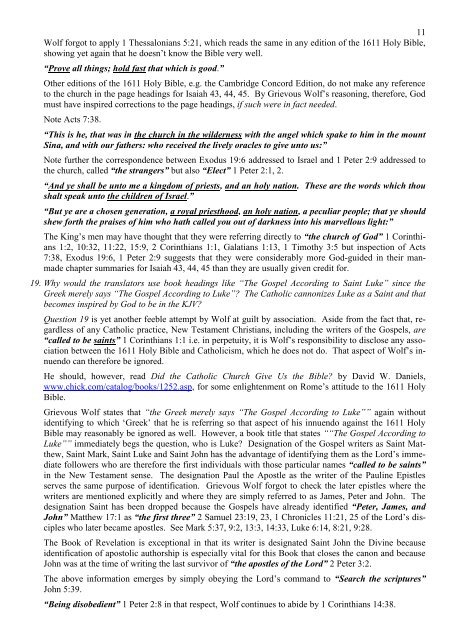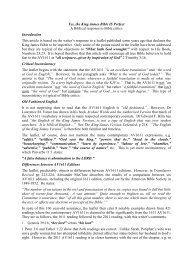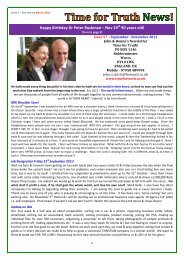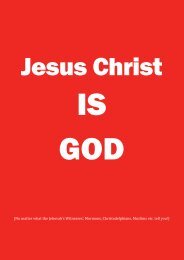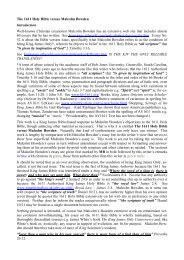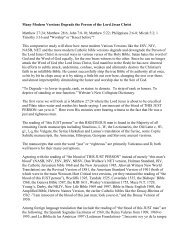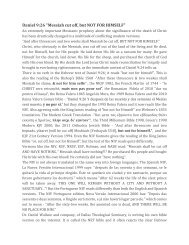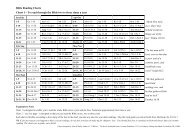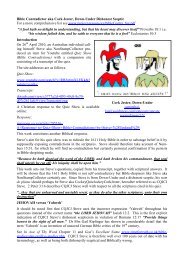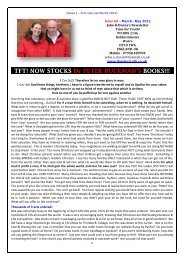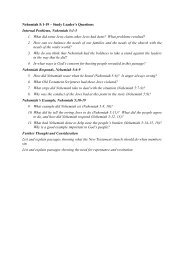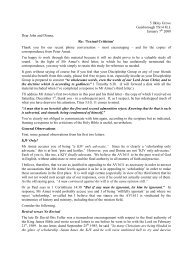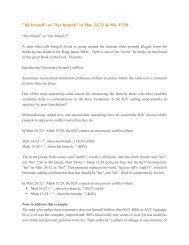A Grievous Wolf - Time for Truth
A Grievous Wolf - Time for Truth
A Grievous Wolf - Time for Truth
You also want an ePaper? Increase the reach of your titles
YUMPU automatically turns print PDFs into web optimized ePapers that Google loves.
11<br />
<strong>Wolf</strong> <strong>for</strong>got to apply 1 Thessalonians 5:21, which reads the same in any edition of the 1611 Holy Bible,<br />
showing yet again that he doesn’t know the Bible very well.<br />
“Prove all things; hold fast that which is good.”<br />
Other editions of the 1611 Holy Bible, e.g. the Cambridge Concord Edition, do not make any reference<br />
to the church in the page headings <strong>for</strong> Isaiah 43, 44, 45. By <strong>Grievous</strong> <strong>Wolf</strong>’s reasoning, there<strong>for</strong>e, God<br />
must have inspired corrections to the page headings, if such were in fact needed.<br />
Note Acts 7:38.<br />
“This is he, that was in the church in the wilderness with the angel which spake to him in the mount<br />
Sina, and with our fathers: who received the lively oracles to give unto us:”<br />
Note further the correspondence between Exodus 19:6 addressed to Israel and 1 Peter 2:9 addressed to<br />
the church, called “the strangers” but also “Elect” 1 Peter 2:1, 2.<br />
“And ye shall be unto me a kingdom of priests, and an holy nation. These are the words which thou<br />
shalt speak unto the children of Israel.”<br />
“But ye are a chosen generation, a royal priesthood, an holy nation, a peculiar people; that ye should<br />
shew <strong>for</strong>th the praises of him who hath called you out of darkness into his marvellous light:”<br />
The King’s men may have thought that they were referring directly to “the church of God” 1 Corinthians<br />
1:2, 10:32, 11:22, 15:9, 2 Corinthians 1:1, Galatians 1:13, 1 Timothy 3:5 but inspection of Acts<br />
7:38, Exodus 19:6, 1 Peter 2:9 suggests that they were considerably more God-guided in their manmade<br />
chapter summaries <strong>for</strong> Isaiah 43, 44, 45 than they are usually given credit <strong>for</strong>.<br />
19. Why would the translators use book headings like “The Gospel According to Saint Luke” since the<br />
Greek merely says “The Gospel According to Luke”? The Catholic cannonizes Luke as a Saint and that<br />
becomes inspired by God to be in the KJV?<br />
Question 19 is yet another feeble attempt by <strong>Wolf</strong> at guilt by association. Aside from the fact that, regardless<br />
of any Catholic practice, New Testament Christians, including the writers of the Gospels, are<br />
“called to be saints” 1 Corinthians 1:1 i.e. in perpetuity, it is <strong>Wolf</strong>’s responsibility to disclose any association<br />
between the 1611 Holy Bible and Catholicism, which he does not do. That aspect of <strong>Wolf</strong>’s innuendo<br />
can there<strong>for</strong>e be ignored.<br />
He should, however, read Did the Catholic Church Give Us the Bible? by David W. Daniels,<br />
www.chick.com/catalog/books/1252.asp, <strong>for</strong> some enlightenment on Rome’s attitude to the 1611 Holy<br />
Bible.<br />
<strong>Grievous</strong> <strong>Wolf</strong> states that “the Greek merely says “The Gospel According to Luke”” again without<br />
identifying to which ‘Greek’ that he is referring so that aspect of his innuendo against the 1611 Holy<br />
Bible may reasonably be ignored as well. However, a book title that states ““The Gospel According to<br />
Luke”” immediately begs the question, who is Luke? Designation of the Gospel writers as Saint Matthew,<br />
Saint Mark, Saint Luke and Saint John has the advantage of identifying them as the Lord’s immediate<br />
followers who are there<strong>for</strong>e the first individuals with those particular names “called to be saints”<br />
in the New Testament sense. The designation Paul the Apostle as the writer of the Pauline Epistles<br />
serves the same purpose of identification. <strong>Grievous</strong> <strong>Wolf</strong> <strong>for</strong>got to check the later epistles where the<br />
writers are mentioned explicitly and where they are simply referred to as James, Peter and John. The<br />
designation Saint has been dropped because the Gospels have already identified “Peter, James, and<br />
John” Matthew 17:1 as “the first three” 2 Samuel 23:19, 23, 1 Chronicles 11:21, 25 of the Lord’s disciples<br />
who later became apostles. See Mark 5:37, 9:2, 13:3, 14:33, Luke 6:14, 8:21, 9:28.<br />
The Book of Revelation is exceptional in that its writer is designated Saint John the Divine because<br />
identification of apostolic authorship is especially vital <strong>for</strong> this Book that closes the canon and because<br />
John was at the time of writing the last survivor of “the apostles of the Lord” 2 Peter 3:2.<br />
The above in<strong>for</strong>mation emerges by simply obeying the Lord’s command to “Search the scriptures”<br />
John 5:39.<br />
“Being disobedient” 1 Peter 2:8 in that respect, <strong>Wolf</strong> continues to abide by 1 Corinthians 14:38.


